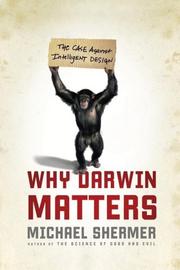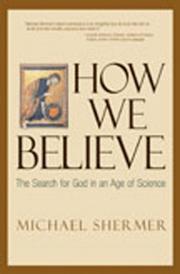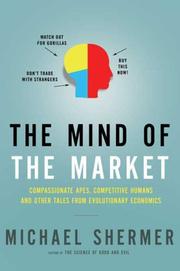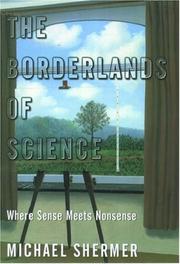| Listing 1 - 10 of 27 | << page >> |
Sort by
|

ISBN: 9780805081213 0805081216 Year: 2006 Publisher: New York : Times Books,
Abstract | Keywords | Export | Availability | Bookmark
 Loading...
Loading...Choose an application
- Reference Manager
- EndNote
- RefWorks (Direct export to RefWorks)
Science is on the defensive. Half of Americans reject the theory of evolution and "Intelligent Design" campaigns are gaining ground. Classroom by classroom, creationism is overthrowing biology.In Why Darwin Matters, bestselling author Michael Shermer explains how the newest brand of creationism appeals to our predisposition to look for a designer behind life's complexity. Shermer decodes the scientific evidence to show that evolution is not "just a theory" and illustrates how it achieves the design of life through the bottom-up process of natural selection. Shermer, once an evangelical Christian and a creationist, argues that Intelligent Design proponents are invoking a combination of bad science, political antipathy, and flawed theology. He refutes their pseudoscientific arguments and then demonstrates why conservatives and people of faith can and should embrace evolution. He then appraises the evolutionary questions that truly need to be settled, building a powerful argument for science itself.Cutting the politics away from the facts, Why Darwin Matters is an incisive examination of what is at stake in the debate over evolution.

ISBN: 9780805077698 Year: 2005 Publisher: New York (N.Y.) : Holt,
Abstract | Keywords | Export | Availability | Bookmark
 Loading...
Loading...Choose an application
- Reference Manager
- EndNote
- RefWorks (Direct export to RefWorks)

ISBN: 071673561X 071674161X Year: 2000 Publisher: New York (N.Y.) : Freeman,
Abstract | Keywords | Export | Availability | Bookmark
 Loading...
Loading...Choose an application
- Reference Manager
- EndNote
- RefWorks (Direct export to RefWorks)
215 --- Religion and science --- Faith and reason --- Faith and logic --- Logic and faith --- Reason --- Reason and faith --- Reason and religion --- Religion and reason --- Christianity and science --- Geology --- Geology and religion --- Science --- Science and religion --- Godsdienst en wetenschap --- Religious aspects --- Faith and reason. --- Religion and science.

ISBN: 0805078320 9780805078329 Year: 2008 Publisher: New York Times Books
Abstract | Keywords | Export | Availability | Bookmark
 Loading...
Loading...Choose an application
- Reference Manager
- EndNote
- RefWorks (Direct export to RefWorks)
In this eye-opening exploration, author and psychologist Michael Shermer uncovers the evolutionary roots of our economic behavior. Drawing on the new field of neuroeconomics, Shermer investigates what brain scans reveal about bargaining, snap purchases, and establishing trust in business. He scrutinizes experiments in behavioral economics to understand why people hang on to losing stocks, why negotiations disintegrate into tit-for-tat disputes, and why money does not make us happy. He brings together astonishing findings from psychology, biology, and other sciences to describe how our tribal ancestry makes us suckers for brands, why researchers believe cooperation unleashes biochemicals similar to those released during sex, why free trade promises to build alliances between nations, and how even capuchin monkeys get indignant if they don't get a fair reward for their work.--From publisher description.
AA / International- internationaal --- 330.00 --- 203 --- Economische en sociale theorieën: algemeenheden. --- Sociografie. Algemene beschrijving van de gemeenschappen (Sociologie). --- Economics --- Evolutionary economics. --- Psychological aspects. --- Evolutionary economics --- Behavioral economics --- Behavioural economics --- Psychological aspects --- Sociografie. Algemene beschrijving van de gemeenschappen (Sociologie) --- Economische en sociale theorieën: algemeenheden

ISBN: 0195143264 Year: 2001 Publisher: Oxford : Oxford university press,
Abstract | Keywords | Export | Availability | Bookmark
 Loading...
Loading...Choose an application
- Reference Manager
- EndNote
- RefWorks (Direct export to RefWorks)
Belief and doubt. --- Parapsychology and science. --- Science --- Skepticism.

ISBN: 0520234693 9780520234697 Year: 2002 Publisher: Berkeley (Calif.) : University of California press,
Abstract | Keywords | Export | Availability | Bookmark
 Loading...
Loading...Choose an application
- Reference Manager
- EndNote
- RefWorks (Direct export to RefWorks)
Book
ISBN: 9780805096910 0805096914 9780805096934 Year: 2015 Publisher: New York, N.Y. Henry Holt and Company
Abstract | Keywords | Export | Availability | Bookmark
 Loading...
Loading...Choose an application
- Reference Manager
- EndNote
- RefWorks (Direct export to RefWorks)
"From Galileo and Newton to Thomas Hobbes and Martin Luther King, Jr., thinkers throughout history have consciously employed scientific techniques to better understand the non-physical world. The Age of Reason and the Enlightenment led theorists to apply scientific reasoning to the non-scientific disciplines of politics, economics, and moral philosophy. Instead of relying on the woodcuts of dissected bodies in old medical texts, physicians opened bodies themselves to see what was there; instead of divining truth through the authority of an ancient holy book or philosophical treatise, people began to explore the book of nature for themselves through travel and exploration; instead of the supernatural belief in the divine right of kings, people employed a natural belief in the right of democracy. In this provocative and compelling book, Shermer will explain how abstract reasoning, rationality, empiricism, skepticism--scientific ways of thinking--have profoundly changed the way we perceive morality and, indeed, move us ever closer to a more just world"--
Science --- 001.35 --- moraal --- wetenschappen --- Natural science --- Natural sciences --- Science of science --- Sciences --- Moral and ethical aspects&delete& --- History --- Social aspects&delete& --- Wetenschapskritiek. Bezwaren tegen wetenschap --- Philosophy and psychology of culture --- General ethics --- Moral and ethical aspects --- Social aspects

ISBN: 128053527X 9786610535279 0198032722 9780198032724 9780195143263 0195143264 0195157982 9780195157987 0190286636 9780190286637 6610535272 Year: 2001 Publisher: Oxford New York Oxford University Press
Abstract | Keywords | Export | Availability | Bookmark
 Loading...
Loading...Choose an application
- Reference Manager
- EndNote
- RefWorks (Direct export to RefWorks)
As author of the bestselling Why People Believe Weird Things and How We Believe, and Editor-in-Chief of Skeptic magazine, Michael Shermer has emerged as the nation's number one scourge of superstition and bad science. Now, in The Borderlands of Science, he takes us to the place where real science (such as the big bang theory), borderland science (superstring theory), and just plain nonsense (Big Foot) collide with one another. Shermer argues that science is the best lens through which to view the world, but he recognizes that it's often difficult for most of us to tell where valid science leav
Science --- Belief and doubt. --- Parapsychology and science. --- Skepticism. --- Scepticism --- Unbelief --- Agnosticism --- Belief and doubt --- Free thought --- Science and parapsychology --- Conviction --- Doubt --- Consciousness --- Credulity --- Emotions --- Knowledge, Theory of --- Philosophy --- Psychology --- Religion --- Will --- Rationalism --- Skepticism
Book
ISBN: 1108803075 1108779395 1108800106 1108489788 Year: 2020 Publisher: Cambridge : Cambridge University Press,
Abstract | Keywords | Export | Availability | Bookmark
 Loading...
Loading...Choose an application
- Reference Manager
- EndNote
- RefWorks (Direct export to RefWorks)
Who is the 'Devil'? And what is he due? The Devil is anyone who disagrees with you. And what he is due is the right to speak his mind. He must have this for your own safety's sake because his freedom is inextricably tied to your own. If he can be censored, why shouldn't you be censored? If we put barriers up to silence 'unpleasant' ideas, what's to stop the silencing of any discussion? This book is a full-throated defense of free speech and open inquiry in politics, science, and culture by the New York Times bestselling author and skeptic Michael Shermer. The new collection of essays and articles takes the Devil by the horns by tackling five key themes: free thought and free speech, politics and society, scientific humanism, religion, and the ideas of controversial intellectuals. For our own sake, we must give the Devil his due.
Political culture. --- Culture --- Political science --- Freedom of speech. --- Democracy. --- Self-government --- Equality --- Representative government and representation --- Republics --- Free speech --- Freedom of speech --- Liberty of speech --- Speech, Freedom of --- Civil rights --- Freedom of expression --- Assembly, Right of --- Freedom of information --- Intellectual freedom --- Law and legislation

ISBN: 0195148304 Year: 2002 Publisher: Oxford : Oxford university press,
Abstract | Keywords | Export | Availability | Bookmark
 Loading...
Loading...Choose an application
- Reference Manager
- EndNote
- RefWorks (Direct export to RefWorks)
| Listing 1 - 10 of 27 | << page >> |
Sort by
|

 Search
Search Feedback
Feedback About UniCat
About UniCat  Help
Help News
News